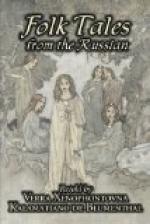In one of the suburbs there was a poor hut where an old man lived with his three sons, Thomas, Pakhom, and Ivan. The old man was not only clever, he was wise. He had happened once to have a chat with the devil. They talked together while the old man treated him to a tumbler of wine and got out of the devil many great secrets. Soon after this the peasant began to perform such marvelous acts that the neighbors called him a sorcerer, a magician, and even supposed that the devil was his kin.
Yes, it is true that the old man performed great marvels. Were you longing for love, go to him, bow to the old man, and he would give you some strange root, and the sweetheart would be yours. If there is a theft, again to him with the tale. The old man conjures over some water, takes an officer along straight to the thief, and your lost is found; only take care that the officer steals it not.
Indeed the old man was very wise; but his children were not his equals. Two of them were almost as clever. They were married and had children, but Ivan, the youngest, was single. No one cared much for him because he was rather a fool, could not count one, two, three, and only drank, or ate, or slept, or lay around. Why care for such a person? Every one knows life for some is brighter than for others. But Ivan was good-hearted and quiet. Ask of him a belt, he will give a kaftan also; take his mittens, he certainly would want to have you take his cap with them. And that is why all liked Ivan, and usually called him Ivanoushka the Simpleton; though the name means fool, at the same time it carries the idea of a kind heart.
Our old man lived on with his sons until finally his hour came to die. He called his three sons and said to them:
“Dear children of mine, my dying hour is at hand and ye must fulfill my will. Every one of you come to my grave and spend one night with me; thou, Tom, the first night; thou, Pakhom, the second night; and thou, Ivanoushka the Simpleton, the third.”
Two of the brothers, as clever people, promised their father to do according to his bidding, but the Simpleton did not even promise; he only scratched his head.
The old man died and was buried. During the celebration the family and guests had plenty of pancakes to eat and plenty of whisky to wash them down.
Now you remember that on the first night Thomas was to go to the grave; but he was too lazy, or possibly afraid, so he said to the Simpleton:
“I must be up very early to-morrow morning; I have to thresh; go thou for me to our father’s grave.”
“All right,” answered Ivanoushka the Simpleton. He took a slice of black rye bread, went to the grave, stretched himself out, and soon began to snore.
The church clock struck midnight; the wind roared, the owl cried in the trees, the grave opened and the old man came out and asked:
“Who is there?”
“I,” answered Ivanoushka.




